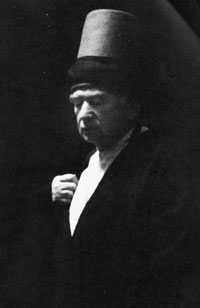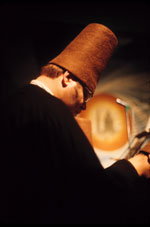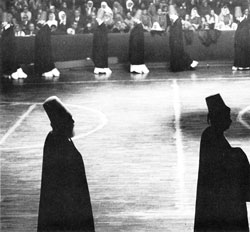|
What is "musical"
A solo voice starts to recite the Hymn of Praise to the Prophet (Naat-ı Mevlana, Naat-ı Şerif). We sense everyone's breathing becoming deeper and slower. We feel a gradual transition from the distractions of the mundane world to the focus of the spiritual world.
The profound silence after the conclusion of the Naat is broken by a wordless improvisation on the ney reed flute (Ney Baş Taksimi).
The ney is the quintessential Mevlevi instrument. "Listen to the ney," commands Rumi in the opening of his great mystical poem, the Mesnevi. Listen to its plaintive cries, its yearning. With its breath the ney utters the sacred word "Hu."
The dervishes rise from their seated position and begin their ritual perambulation of the hall (Sultan Veled Devri).

Much later, after the dervishes complete their turnings, we witness a unique extramusical event in the ceremony. The Şeyh leaves his post for the first time
and begins to turns alone. The drums fall silent. We hear the soft rhythmic whisper of the Şeyh's
slippers as he turns.
In a "musical" context, we can make the case that poetry, spiritual
meaning, kinetic actions, and other "extramusical" events are inextricably
linked. See also
9. TEXT EMPHASIS. |

